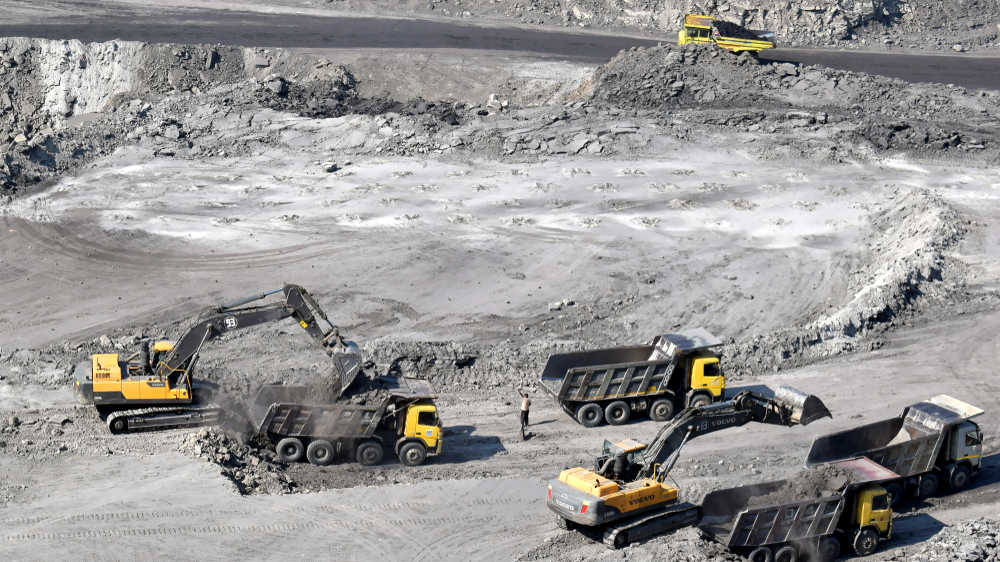India paves the way for commercial mining of vital minerals to fuel industrial growth

India paves the way for commercial mining of vital minerals to fuel industrial growth
The Union cabinet has granted approval for amendments to the Mines and Minerals Act, lifting the ban on commercial mining of six important minerals. The minerals include lithium, beryllium, titanium, niobium, tantalum, and zirconium. These minerals play a vital role in multiple industries, including electric vehicles, batteries, glassware, automotive parts, solar panels, semiconductors, wind turbines, defence machinery, telecommunications equipment, capacitors, super alloys, space hardware, carbides, and medical technology.
The reversal of the prohibition on commercial mining of these minerals is significant as it enables their extraction and utilization within the country. This move aligns with the government’s focus on promoting domestic manufacturing, reducing import dependency, and bolstering key sectors such as renewable energy, electric mobility, and advanced technologies.
Industries such as electric vehicles and renewable energy rely heavily on lithium, a key component in batteries. Beryllium, titanium, niobium, tantalum, and zirconium find applications in various sectors due to their unique properties, ranging from aerospace and defense to electronics and healthcare.

By allowing commercial mining of these minerals, the government aims to enhance self-sufficiency and promote the development of a robust domestic supply chain for critical industries. This decision is expected to facilitate increased production, reduce costs, and drive technological advancements in sectors that rely on these minerals.
The amendment to the Mines and Minerals Act is a significant step towards harnessing India’s mineral resources and unlocking their potential for economic growth and industrial development.
It signifies the government’s recognition of the strategic importance of these minerals and their contribution to various high-tech industries.
The availability of these minerals within the country will not only support the growth of domestic industries but also provide opportunities for job creation, technology transfer, and research and development activities. The move is likely to attract investments and promote innovation in sectors that rely on these minerals.

As the amendments to the Mines and Minerals Act come into effect, further details and guidelines pertaining to the commercial mining of these minerals are expected to be released by the government. Staying updated with official announcements and reliable sources will provide comprehensive information on the implementation and impact of these changes.
India’s goal to become a prominent manufacturing center and reduce its dependence on imported minerals is aligned with its larger vision of self-reliance and boosting domestic manufacturing capabilities. Currently, India imports all of its lithium from countries like Chile, Russia, China, Ireland, and Belgium. Similarly, beryllium is sourced from Russia, the UK, Netherlands, South Africa, and China.
By focusing on establishing domestic sources and increasing domestic production of these critical minerals, India aims to strengthen its supply chain resilience, reduce import reliance, and ensure a consistent and secure supply for its manufacturing industries. This strategic approach will not only enhance India’s manufacturing capabilities but also support the growth of key sectors such as electric vehicles, renewable energy, and high-tech industries.
Reducing import dependence on these minerals is of utmost importance as it provides India with greater control over the availability, quality, and cost of these essential resources. By establishing domestic sources and increasing local production, the country can mitigate risks associated with supply chain disruptions, price volatility, and geopolitical factors.
In addition to securing the supply of these minerals, domestic production also brings economic benefits. It fosters job creation, technology development, and overall industrial growth. Moreover, it enables India to leverage its mineral resources and capitalize on the value-added opportunities across various downstream industries.
By reducing reliance on imported minerals and promoting domestic production, India can enhance its manufacturing competitiveness, attract investments, and foster innovation and research in related sectors. This approach aligns with the country’s vision of building a self-reliant economy and ensuring long-term sustainable growth.

To achieve its objectives, India will likely focus on fostering an enabling regulatory framework, encouraging investments in mineral exploration and mining projects, promoting research and development initiatives, and fostering collaboration between government, industry, and academia. These efforts will contribute to establishing India as a self-sufficient manufacturing hub and reducing its dependency on imported minerals.
Currently, private companies in India are not allowed to engage in commercial mining of essential minerals. Exploration and mining operations for these minerals are solely conducted by government agencies. However, the government’s decision to reverse the prohibition on commercial mining of certain minerals, as mentioned earlier, indicates a potential shift in this policy.
In June, the Ministry of Mines released its inaugural report on the identification of Critical Minerals for India. The report identified approximately 30 essential minerals that play a crucial role in various industries. These minerals include titanium, tungsten, vanadium, zircon, niobium, germanium, nickel, graphite, silicon, antimony, beryllium, bismuth, and others.
The identification of these critical minerals demonstrates the government’s recognition of their strategic importance and their contribution to key sectors of the economy. The report serves as a foundation for developing policies and initiatives to promote domestic production, reduce import reliance, and enhance self-sufficiency in these critical mineral resources.
By identifying and prioritizing these minerals, the government aims to foster exploration, extraction, and value addition within the country. This is expected to create new opportunities for investment, technology development, job creation, and research and development in related sectors.
The identification of critical minerals also enables the government to formulate targeted policies, regulatory frameworks, and incentives to encourage domestic production, ensure sustainable mining practices, and secure a stable supply chain for industries that rely on these minerals.
It is worth noting that the identification of critical minerals and the subsequent initiatives to promote their domestic production align with India’s larger vision of self-reliance, Make in India campaign, and the Atmanirbhar Bharat (Self-Reliant India) initiative. These efforts collectively aim to boost the country’s manufacturing capabilities, reduce import dependence, and create a robust ecosystem for sustainable economic growth.
As the government progresses in implementing policies and initiatives related to critical minerals, further details, guidelines, and specific measures are expected to be announced. Staying informed through official sources and reliable news channels will provide the most up-to-date information on these developments.Beryllium is a highly versatile metal known for its exceptional strength-to-weight ratio and excellent thermal conductivity.
It finds applications in various industries, including aerospace, defense, telecommunications, IT, and nuclear energy. Beryllium is used in high-performance alloys, electronic components, X-ray equipment, missile systems, and more.
Titanium is a lightweight metal with remarkable strength, excellent corrosion resistance, and biocompatibility. Its properties make it highly desirable for applications in the aerospace, automotive, medical, and consumer electronics industries. Titanium is used in aircraft components, prosthetics, dental implants, sporting goods, and other products where strength, durability, and lightweight characteristics are critical.
Niobium is a refractory metal known for its high melting point, excellent corrosion resistance, and superconducting properties. It finds applications in the aerospace industry for manufacturing jet engines, rockets, and supersonic aircraft. Niobium is also used in nuclear reactors, superconducting magnets, electronic devices, and specialized alloys for high-temperature applications.
Tantalum is a rare metal with excellent resistance to corrosion and high heat. It is primarily used in the production of electrolytic capacitors, which are vital components in electronic devices. Tantalum also finds application in chemical processing equipment, surgical implants, and superalloys for the aerospace and defence industries.
Zirconium is a highly versatile metal known for its resistance to corrosion, heat, and chemical reactions. It is commonly used in nuclear reactors, chemical processing plants, and aerospace applications. Zirconium alloys are used to fabricate heat exchangers, pipes, and valves in corrosive environments. The metal is also utilized in the production of high-performance alloys, ceramics, and pigments.
Lithium is a lightweight and highly reactive metal widely recognized for its use in batteries. It is critical in powering portable electronics, electric vehicles, renewable energy storage systems, and grid-scale energy storage solutions. Lithium-ion batteries are known for their high energy density, longer lifespan, and rechargeable capabilities, making them essential for the growing electric mobility and renewable energy sectors.
These critical minerals are indispensable in numerous industries, contributing to technological advancements, sustainability, and economic growth. The availability and domestic production of these minerals are crucial for reducing import dependence, fostering innovation, and strengthening the self-reliance of India’s industries.




